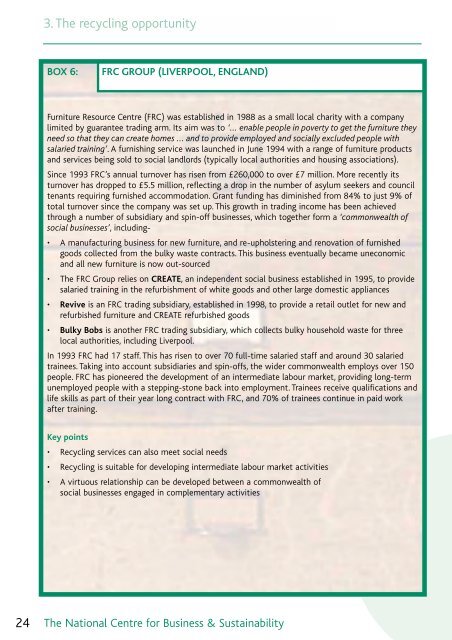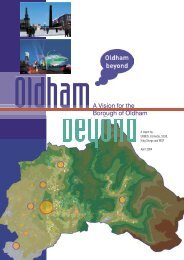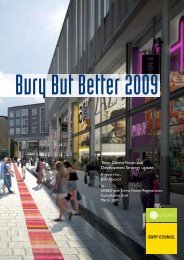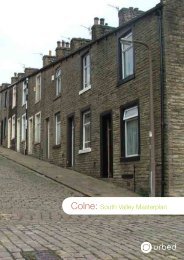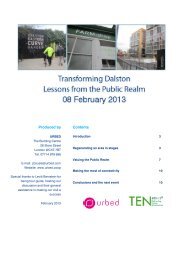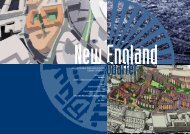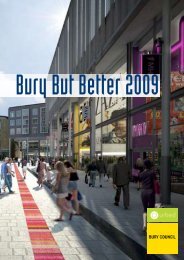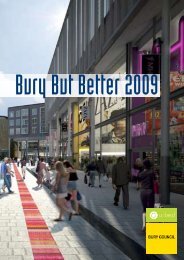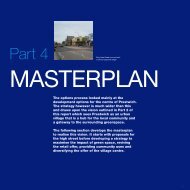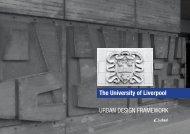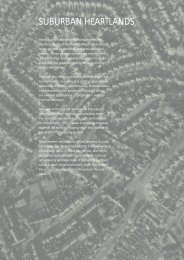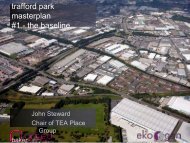A Better Way to Recycle: co-operative and community ... - Urbed
A Better Way to Recycle: co-operative and community ... - Urbed
A Better Way to Recycle: co-operative and community ... - Urbed
Create successful ePaper yourself
Turn your PDF publications into a flip-book with our unique Google optimized e-Paper software.
3. The recycling opportunityBOX 6:FRC GROUP (LIVERPOOL, ENGLAND)Furniture Resource Centre (FRC) was established in 1988 as a small local charity with a <strong>co</strong>mpanylimited by guarantee trading arm. Its aim was <strong>to</strong> ‘… enable people in poverty <strong>to</strong> get the furniture theyneed so that they can create homes ... <strong>and</strong> <strong>to</strong> provide employed <strong>and</strong> socially excluded people withsalaried training’. A furnishing service was launched in June 1994 with a range of furniture products<strong>and</strong> services being sold <strong>to</strong> social l<strong>and</strong>lords (typically local authorities <strong>and</strong> housing associations).Since 1993 FRC’s annual turnover has risen from £260,000 <strong>to</strong> over £7 million. More recently itsturnover has dropped <strong>to</strong> £5.5 million, reflecting a drop in the number of asylum seekers <strong>and</strong> <strong>co</strong>unciltenants requiring furnished ac<strong>co</strong>mmodation. Grant funding has diminished from 84% <strong>to</strong> just 9% of<strong>to</strong>tal turnover since the <strong>co</strong>mpany was set up. This growth in trading in<strong>co</strong>me has been achievedthrough a number of subsidiary <strong>and</strong> spin-off businesses, which <strong>to</strong>gether form a ‘<strong>co</strong>mmonwealth ofsocial businesses’, including-• A manufacturing business for new furniture, <strong>and</strong> re-upholstering <strong>and</strong> renovation of furnishedgoods <strong>co</strong>llected from the bulky waste <strong>co</strong>ntracts. This business eventually became une<strong>co</strong>nomic<strong>and</strong> all new furniture is now out-sourced• The FRC Group relies on CREATE, an independent social business established in 1995, <strong>to</strong> providesalaried training in the refurbishment of white goods <strong>and</strong> other large domestic appliances• Revive is an FRC trading subsidiary, established in 1998, <strong>to</strong> provide a retail outlet for new <strong>and</strong>refurbished furniture <strong>and</strong> CREATE refurbished goods• Bulky Bobs is another FRC trading subsidiary, which <strong>co</strong>llects bulky household waste for threelocal authorities, including Liverpool.In 1993 FRC had 17 staff. This has risen <strong>to</strong> over 70 full-time salaried staff <strong>and</strong> around 30 salariedtrainees. Taking in<strong>to</strong> ac<strong>co</strong>unt subsidiaries <strong>and</strong> spin-offs, the wider <strong>co</strong>mmonwealth employs over 150people. FRC has pioneered the development of an intermediate labour market, providing long-termunemployed people with a stepping-s<strong>to</strong>ne back in<strong>to</strong> employment. Trainees receive qualifications <strong>and</strong>life skills as part of their year long <strong>co</strong>ntract with FRC, <strong>and</strong> 70% of trainees <strong>co</strong>ntinue in paid workafter training.Key points• Recycling services can also meet social needs• Recycling is suitable for developing intermediate labour market activities• A virtuous relationship can be developed between a <strong>co</strong>mmonwealth ofsocial businesses engaged in <strong>co</strong>mplementary activities24The National Centre for Business & Sustainability


